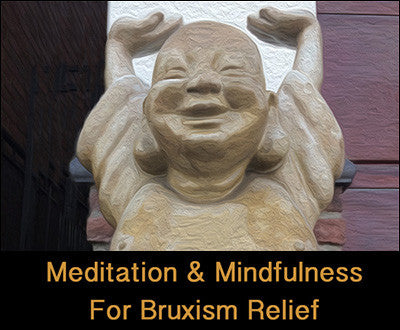Meditation and Mindfulness For Bruxism Relief
If you're a teeth grinder and experience regular bouts of bruxism during the day, or at night while you sleep, you need to relax. Seriously and literally.

Bruxism is the term for teeth grinding and clenching, and while there are many reasons why people grind their teeth, one of the biggest causes is stress.
The first step for bruxers is to wear a night guard during sleep to save the teeth from severe tooth wear, and chipped or broken teeth.
While mouth guards will protect the teeth, they will not stop people from clenching, although they may relieve some of the bite force and aid in breaking the habit.
The next step is to address the root cause of bruxism. Correcting the cause of bruxism will not only help stop teeth grinding, it can also reduce TMJ, jaw pain, and ear discomfort from grinding.
Stress Can Cause Bruxism
There are many reasons why people grind their teeth but stress and anxiety usually top the list. Stress is a defense mechanism that causes a physical and emotional response that inspires a whole host of problems, including increased heart and breath rate, muscle tension, and a surge of adrenaline to flow through the body.
The emotional side of stress causes people to worry more and have difficulty concentrating or sleeping. The physical side of stress can lead to headaches, nausea, fatigue, and irritability. Oh yes, and teeth grinding.
Learn to Relax Through Meditation and Mindfulness
To combat stress and anxiety, it's important to learn how to relax and be more calm. Meditation and Mindfulness are both excellent ways to calm the mind.
Many people think meditation and mindfulness are the same thing, and although they both focus on being here and now in the present moment, there are slight differences between them. Nonetheless, practicing both on a regular basis can do wonders for calming the mind and being less stressed throughout the day and even at night while we sleep.
Meditation usually involves focusing attention on a single object or subject. One of the most common ways is to focus on breathing. The mind is only concerned with paying attention to breathing, and if the mind wanders, take note of it and gently bring it back to focusing on breathing.
We all have brains that race along above the speed limit and we exist in a state of urgency most of the time. By focusing on one thing, we slow the mind and create a sense of calm.
Meditation can, and should be done, as the first thing every morning to start the day and as the last thing at night before going to sleep. Some people meditate for 20 minutes or longer, but in reality one or two minutes twice a day can do wonders for most of us.
A great book to consider is "Joy On Demand" by Chade-Meng Tan and it explores the benefits of a single breath meditation. The book is great for beginners and sets the tone for integrating meditation into daily life.
In the book, Tan explains that meditation helps train the mind to find, and access inner joy, increase focus, and calm the mind on demand.
Don't worry so much about trying to sit in a perfect position or not having the mind wander. The most important thing is to be comfortable and focus on breathing and calming the mind. With practice and a little patience everyone gets better at doing it.
For anyone that has trouble keeping the mind focused on breathing without thinking about whether penguins have knees, a simple candle meditation might be a great way to stop the mind from racing.
Mindfulness on the other hand, is more about paying full attention to whatever it is we're doing at any single moment. If we're washing the dishes, focus on every detail about washing the dishes.
- Is the water warm or hot?
- Are the soapsuds thick and bubbly or thin and in need of more soap?
- If using scented soap, what does it smell like?
- Does one of the pans require a lot of scrubbing?
Mindfulness can be put in practice throughout the day in everything we do, like driving to work, eating lunch or dinner, playing with the kids, or watching a movie.
When we are truly in the moment and completely focusing on whatever it is we are doing, there's no room in our mind to think about all the other things we need to take care of in our life. If paying the bills creeps in while watching a movie - we have two choices - either pause the movie and pay the bills, or make a mental note that we will pay the bills after the movie finishes and get back to watching, and enjoying the movie.
What Does All This Have to Do with Teeth Grinding?
Like we said earlier, stress is a major cause of bruxism, and fixing the root cause of stress will reduce bruxism caused by stress. It will also promote better sleep, and when we get better sleep, we decrease the amount of stress in our life.
Meditation and mindfulness are two of the best techniques available for keeping the mind focused on the present, and from aimlessly wandering to things that stimulate worry and anxiety.
A study in 2003 by Richard Davidson found that only eight weeks of meditation practice was enough to show positive effects on the brain and immune system.
Ten years later he performed an even more impressive study that concluded experienced meditators can actually change their gene expression and reduce pro-inflammatory genes from eight hours of intensive meditation practice.
Nobody begins meditation or mindfulness as an expert, and even people who have practiced meditation or mindfulness for decades are still trying to perfect it. The Dalai Lama began practicing as a teenager. Today he's in his eighties and he's still doing it every day.
There's a reason we call it "practice" because that's actually what it is. Most avid practitioners will say though, the more they do it, the better they get and the more benefit they receive.
Think of Meditation and Mindfulness as tools that can be used to calm the mind and reduce stress and anxiety. Every little bit helps and it adds up over time. Even a small reduction in stress can lighten the fatigue from bruxism and help reduce teeth and jaw pain from grinding and clenching while we sleep.






